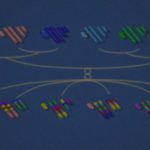Link to Pubmed [PMID] – 21183591
J. Am. Soc. Nephrol. 2011 Feb;22(2):327-35
The mechanisms of progression of chronic kidney disease (CKD) are poorly understood. Epidemiologic studies suggest a strong genetic component, but the genes that contribute to the onset and progression of CKD are largely unknown. Here, we applied an experimental model of CKD (75% excision of total renal mass) to six different strains of mice and found that only the FVB/N strain developed renal lesions. We performed a genome-scan analysis in mice generated by back-crossing resistant and sensitive strains; we identified a major susceptibility locus (Ckdp1) on chromosome 6, which corresponds to regions on human chromosome 2 and 3 that link with CKD progression. In silico analysis revealed that the locus includes the gene encoding the EGF receptor (EGFR) ligand TGF-α. TGF-α protein levels markedly increased after nephron reduction exclusively in FVB/N mice, and this increase preceded the development of renal lesions. Furthermore, pharmacologic inhibition of EGFR prevented the development of renal lesions in the sensitive FVB/N strain. These data suggest that variable TGF-α expression may explain, in part, the genetic susceptibility to CKD progression. EGFR inhibition may be a therapeutic strategy to counteract the genetic predisposition to CKD.

